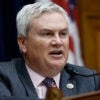About a year before the birth of Obamacare, Dr. Keith Smith, director of the Surgery Center of Oklahoma, posted all the prices for his center’s surgeries online.
Today he’s expanding, looking to build two more operating rooms. His fastest-growing group of patients? Obamacare enrollees.
Though they have Obamacare health insurance plans, many patients are saddled with high deductibles. Looking for alternatives, some travel across the country to the Surgery Center, where the cost of airfare care and travel together is less than the deductibles on their Affordable Care Act plans.
The Surgery Center of Oklahoma is physician-owned. It doesn’t take Medicare or Medicaid and only selectively works with private insurance plans. Patients pay in cash or with cashier’s checks.
Smith says that “coverage doesn’t mean care.” He points out that many of the earliest patients were Canadians, who are covered under their country’s socialized health care system but had been put on waiting lists.
Tasha Bradley, a spokesperson at the U.S. Department of Health and Human Services, points out that enrolling in Obamacare provides financial benefits for some patients.
“Before the Affordable Care Act, consumers could face unlimited out-of-pocket expenses for plans with limited benefits and high deductibles, if they could even get coverage without being denied for a pre-existing condition,” she said. “In the Marketplace, out-of-pocket expenses are capped for the first time, prescription drugs are now covered, and many consumers may qualify for cost-sharing reductions that reduce their out-of-pocket costs.”
One reason it goes faster at the center is because Smith does not accept government funding and is not bound by administrative “red tape” that bog down most hospitals. For example, the center doesn’t have to comply with hospital standards for electronic documentation, an innovation Dr. James Totoro, general surgeon at the Surgery Center for more than 12 years, said is more of a hindrance than a help. Not only is the center’s paper documentation system more efficient, Totoro said, it also allows him to spend more time with his patients and less at a computer.






























